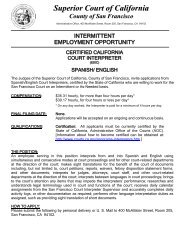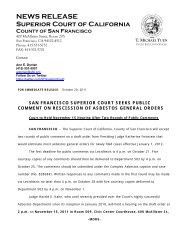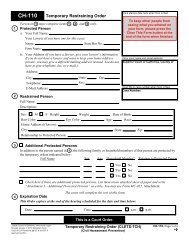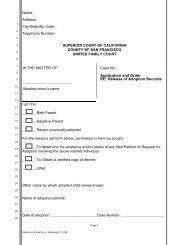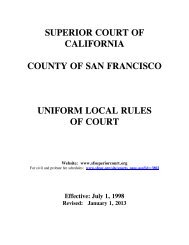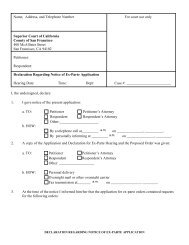Civil Grand Jury report - Superior Court of California
Civil Grand Jury report - Superior Court of California
Civil Grand Jury report - Superior Court of California
- No tags were found...
Create successful ePaper yourself
Turn your PDF publications into a flip-book with our unique Google optimized e-Paper software.
City and County <strong>of</strong> San Francisco2012-2013 <strong>Civil</strong> <strong>Grand</strong> <strong>Jury</strong>plan checker and a certain expediter.” 28 The <strong>Jury</strong> found that this type <strong>of</strong> system has notbeen implemented.b. Ensuring Ethics ComplianceThe <strong>Jury</strong> asked DBI management personnel about efforts to maintain a strong ethicalenvironment. They told us that ethical conduct is a priority; every employee knows thatcustomers must be treated equally and violations will not be tolerated. The DBIcustomers we interviewed believe that the vast majority <strong>of</strong> DBI employees adhere tostrong ethical standards. But those who want to bend or break the rules are still in aposition to grant preferential treatment to favored customers.As in Plan Check, DBI management has not developed a system to identify inspectorswho may be misusing their positions. Inspectors have considerable latitude in schedulingand conducting inspections. They are assigned to geographic territories but have theautonomy to venture outside their territory. Inspectors potentially can approve workoutside their assigned areas, a practice that, according to one previous employee, hasoccurred and resulted in special treatment for select customers. As in Plan Check, DBIhas no control mechanism in place to find out if this is occurring.c. Assessing the Ethical CultureThe DBI has enhanced its ethics regulations and changed its operations to deterfavoritism. We interviewed <strong>of</strong>ficials who were committed to taking all necessary steps toensure fairness. The public perception, however, continues to be that DBI does not treatall customers equally, and DBI does not have systems to identify cases <strong>of</strong> favoritism.A government <strong>of</strong>ficial interviewed by the <strong>Jury</strong> noted that ethical climate surveys are avaluable tool for managers <strong>of</strong> large organizations. The <strong>Jury</strong> reviewed two <strong>of</strong> thesesurveys 29 at other organizations to determine whether this approach might <strong>of</strong>fer somebenefit to DBI. The surveys usually are anonymous and ask employees to respond, forexample, on their level <strong>of</strong> comfort for <strong>report</strong>ing ethical concerns; whether they havewitnessed ethical violations; their awareness <strong>of</strong> the organization’s ethical practices,policies and procedures; and their understanding <strong>of</strong> where to turn for advice about ethics.This type <strong>of</strong> survey could provide DBI leadership with a solid basis for directingmanagement’s attention where it is needed, and could help DBI address the public’sskepticism regarding its ethics.3. Code Enforcement Practices and PrioritiesThe <strong>Jury</strong> became aware <strong>of</strong> code enforcement problems within DBI after talking to City<strong>of</strong>ficials and interested citizens, reviewing complaints, and attending and reviewing theminutes <strong>of</strong> BIC meetings. We were told that DBI is ineffective in addressing blighted andabandoned properties and that it has a backlog <strong>of</strong> complaints. To assess the codeenforcement process, the <strong>Jury</strong> conducted numerous interviews, reviewed the applicableBuilding a Better Future at the Department <strong>of</strong> Building Inspection15



